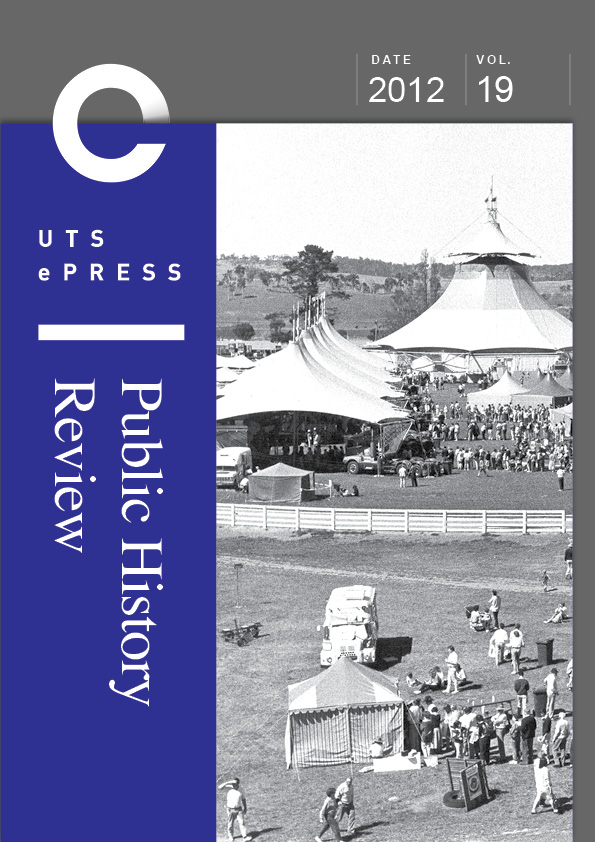The Contested White Lady: A Critique of New Zealand Cultural Heritage Politics
Main Article Content
Abstract
Article Details
Issue
Section
Authors who submit articles to this journal from 31st March 2014 for publication, agree to the following terms:
a) Authors retain copyright and grant the journal right of first publication with the work simultaneously licensed under a Creative Commons Attribution License that allows others to share and adapt the work with an acknowledgement of the work's authorship and initial publication in this journal.
b) Authors are able to enter into separate, additional contractual arrangements for the non-exclusive distribution of the journal's published version of the work (e.g., post it to an institutional repository or publish it in a book), with an acknowledgement of its initial publication in this journal.
c) Authors are permitted and encouraged to post their work online (e.g., in institutional repositories or on their website) prior to and during the submission process, as it can lead to productive exchanges, as well as earlier and greater citation of published work (See The Open Access Citation Advantage Service). Where authors include such a work in an institutional repository or on their website (ie. a copy of a work which has been published in a UTS ePRESS journal, or a pre-print or post-print version of that work), we request that they include a statement that acknowledges the UTS ePRESS publication including the name of the journal, the volume number and a web-link to the journal item.
d) Authors should be aware that the Creative Commons Attribution (CC-BY) License permits readers to share (copy and redistribute the work in any medium or format) and adapt (remix, transform, and build upon the work) for any purpose, even commercially, provided they also give appropriate credit to the work, provide a link to the license, and indicate if changes were made. They may do these things in any reasonable manner, but not in any way that suggests you or your publisher endorses their use.
For Vol 20 (2013) and before, the following copyright applied:
Authors submitting articles to UTSePress publications agree to assign a limited license to UTSePress if and when the manuscript is accepted for publication. This license allows UTSePress to publish a manuscript in a given issue. Articles published by UTSePress are protected by copyright which is retained by the authors who assert their moral rights. Authors control translation and reproduction rights to their works published by UTSePress. UTSePress publications are copyright and all rights are reserved worldwide. Downloads of specific portions of them are permitted for personal use only, not for commercial use or resale. Permissions to reprint or use any materials should be directed to UTSePress.
References
Appadurai, A. 1986. Introduction: commodities and the politics of value. In: Appadurai, A. (ed.) The Social Life of Things: Commodities in Cultural Perspectives. Melbourne: Cambridge University Press. https://doi.org/10.1017/CBO9780511819582.003
Austen, D. 2000. Snack in the eye for snooty neighbours. The New Zealand Herald.
Bell, C. 1996. Inventing New Zealand: everyday myths of pakeha identity, Auckland, Penguin.
Bell, C. 2004. Kiwiana Revisited. In: Bell, C. & Matthewman, S. (eds.) Cultural Studies in Aotearoa New Zealand: identity, space and place. Melbourne: Oxford University Press.
CITY, B. L. 2009. The White Lady [Online]. Available: http://biglittlecity.co.nz/dining/item/the_white_lady_ [Accessed 24 June 2009].
Civitello, L. 2004. Cuisine and Culture: A History of Food and People, Hoboken, Wiley and Sons.
Fernandez-Armesto, F. 2002. Near a Thousand Tables: A History of Food, New York, Simon and Schuster.
Lantis, M. 1960. Vernacular Culture. American Anthropologist, 62, 202-16. https://doi.org/10.1525/aa.1960.62.2.02a00020
Lashley, C. & Morrison, A. (eds.) 2004. In Search of Hospitality: Theoretical Perspectives and Debates, Oxford: Elsevier Butterworth-Heinemann.
Lowenthal, D. 1995. The past is a foreign country, Cambridge, Cambridge University Press.
Mason, L. 2004. Food Culture in Great Britain, Westport, CT, Greenwood Press.
Mcgill, D. 1989. The dinkum Kiwi dictionary, Lower Hutt, Mills Publications.
Mclean, G. 2000. Where sheep may not safely graze: A brief history of New Zealand's heritage movement 1890-2000. In: Trapeznik, A. (ed.) Common ground: heritage and public places in New Zealand. Dunedin: University of Otago Press.
Merriman, N. 1991. Beyond the glass case, Leicester, Leicester University Press.
NEILL, L. But wait there's more: you forgot the White Lady. Journal of Sociology.
Neill, L. 2009. The Contested "White Lady": Perceptions and Social Meanings of the "White Lady". MA, Auckland University of Technology.
Neill, L., Bell, C. & Bryant, T. 2008. The great New Zealand pie cart, Auckland, Moa Becket Hachette Livre.
Neill, L., Bell, C. & Hemmington, N. 2012. A Pie Cart Story: "The longevity of a vernacular fast food eatery". Locale: The Australasian-Pacific Journal of Regional Food Studies, 2, 105.
NEW ZEALAND HISTORY ONLINE. 2012. Available: http://nzhistory.net.nz/page/prince-william-plays-buzzy-bee [Accessed 22 October 2012].
The Kitchen Job, 2009. Directed by PALINO, J. Auckland.
PERROTT, A. 2008. Canvas: Where have all the pie carts gone? New Zealand Herald, 6 September.
PLANET, L. 2010. Auckland Restaurants [Online]. Available: http://lonelyplanet.com/new-zealand/auckland/restaurants/fast-food/white-lady [Accessed 23 November 2010].
SPENCER, C. 2003. British Food, New York, Columbia University Press.
Tannock, S. 1995. Nostalgia Critique. Cultural Studies, 9, 453-64. https://doi.org/10.1080/09502389500490511
Timothy, D. & Boyd, S. 2003. Heritage tourism, Harlow, Pearson Education.
Trapeznik, A. & Mclean, G. 2000. Public history, heritage and place. In: Trapeznik, A. (ed.) Common ground: heritage and public places in New Zealand. Dunedin: University of Otago Press.
Tunbridge, J. & Ashworth, G. J. 1996. Dissonant heritage: the management of the past as a resource in conflict, Chichester, Wiley.
Vossler, G. 2006. Sense or nonsense?: New Zealand heritage legislation in perspective. Public History Review, 13, 66.
Wolfe, R. & Barnett, S. 2001. Kiwiana! The Sequel, Auckland, Penguin.
Woodward, I. 2009. Understanding Material Culture, London, Sage.
